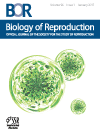-
PDF
- Split View
-
Views
-
Cite
Cite
Don P. Wolf, Jeffrey Boldt, William Byrd, Kathleen B. Bechtol, Acrosomal Status Evaluation in Human Ejaculated Sperm with Monoclonal Antibodies, Biology of Reproduction, Volume 32, Issue 5, 1 June 1985, Pages 1157–1162, https://doi.org/10.1095/biolreprod32.5.1157
Close - Share Icon Share
Abstract
An important question in mammalian gamete physiology concerns how capacitation and the occurrence of acrosome reactions in motile sperm relate to fertility. Evaluation of these relationships has been restricted by practical limitations because rapid, quantitative assays are unavailable. We have developed a rapid, reproducible assay for the evaluation of acrosomal status utilizing monoclonal antibodies specific to antigens localized in the acrosomal cap region of the sperm head. Mice were immunized with human ejaculated sperm preparations and the resultant hybridomas producing antisperm antibody were selected by solid-phase radioimmunoassay and indirect immunofluorescence (IIF). Two monoclonal antibodies (HS-19, HS-21) recognized target antigens restricted to the acrosomal cap by IIF, and 87 ± 8.5% of the sperm in fresh ejaculates from 10 different sperm donors showed positive cap fluorescence with these reagents. Loss of HS-21 binding as measured by IIF was correlated with disappearance of the acrosomal cap as observed directly by transmission electron microscopy. Acrosomal disappearance, artificially induced in vitro using the calcium ionophore A23187, also resulted in a loss of HS-21 binding. The induction of acrosomal loss by ionophore was dependent upon extracellular calcium. The data presented suggest that specific monoclonal antibodies can be used for the rapid evaluation of acrosomal status in mammalian sperm.



